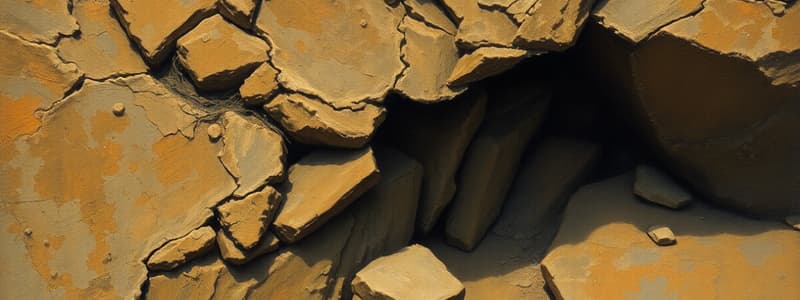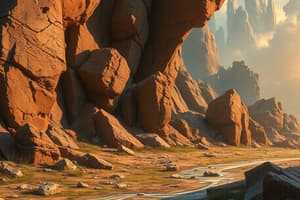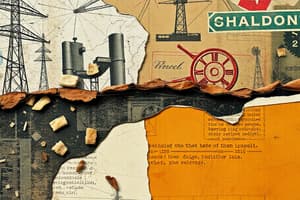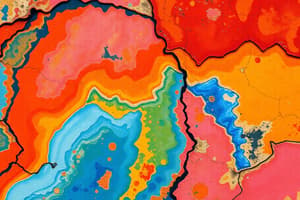Podcast
Questions and Answers
Which of the following factors does NOT contribute to mass wasting?
Which of the following factors does NOT contribute to mass wasting?
- Loss of vegetation
- Earthquakes
- Increased precipitation
- Temperature changes (correct)
What type of mass wasting involves the sliding of coherent rock material along a curved surface?
What type of mass wasting involves the sliding of coherent rock material along a curved surface?
- Rockslide
- Slump (correct)
- Earthflow
- Debris flow
Which type of stress occurs when rocks are pushed together?
Which type of stress occurs when rocks are pushed together?
- Shear stress
- Tensional stress
- Compressional stress (correct)
- Ductile stress
What is a significant effect of mass-wasting events on local economies?
What is a significant effect of mass-wasting events on local economies?
Which type of mass wasting moves at high speeds and is often water-laden?
Which type of mass wasting moves at high speeds and is often water-laden?
Which characteristic shape is often formed by an earthflow?
Which characteristic shape is often formed by an earthflow?
What is mechanical weathering primarily characterized by?
What is mechanical weathering primarily characterized by?
Which of the following is NOT an example of mechanical weathering?
Which of the following is NOT an example of mechanical weathering?
Which process allows water to expand and further crack rocks when it freezes?
Which process allows water to expand and further crack rocks when it freezes?
What role do living organisms play in weathering?
What role do living organisms play in weathering?
Which factor does NOT influence the rate of chemical weathering?
Which factor does NOT influence the rate of chemical weathering?
Which of the following best describes salt crystal growth in weathering?
Which of the following best describes salt crystal growth in weathering?
Which climate condition is most likely to enhance chemical weathering?
Which climate condition is most likely to enhance chemical weathering?
What is the primary difference between mechanical and chemical weathering?
What is the primary difference between mechanical and chemical weathering?
What is the result of abrasion in weathering processes?
What is the result of abrasion in weathering processes?
Which factor significantly affects the rate of weathering in rocks?
Which factor significantly affects the rate of weathering in rocks?
What type of minerals cause rocks to weather more rapidly?
What type of minerals cause rocks to weather more rapidly?
In which climate conditions is weathering expected to occur at a higher rate?
In which climate conditions is weathering expected to occur at a higher rate?
What is a significant consequence of soil erosion?
What is a significant consequence of soil erosion?
What method helps prevent soil erosion by wind?
What method helps prevent soil erosion by wind?
Which mass wasting process is characterized by the downslope movement of varied-sized fragments due to high water saturation?
Which mass wasting process is characterized by the downslope movement of varied-sized fragments due to high water saturation?
Which of the following is NOT a method used to control erosion on sloped land?
Which of the following is NOT a method used to control erosion on sloped land?
What effect does notillage farming have on soil erosion?
What effect does notillage farming have on soil erosion?
What process involves the slow downslope movement of soil and is characterized by a gradual change in vegetation?
What process involves the slow downslope movement of soil and is characterized by a gradual change in vegetation?
What is the main cause of mass wasting events like rockslides and debris flows?
What is the main cause of mass wasting events like rockslides and debris flows?
Flashcards
Weathering
Weathering
The process that breaks down rocks on Earth's surface.
Mechanical Weathering
Mechanical Weathering
Breaking rocks into smaller pieces by physical means.
Thermal Expansion
Thermal Expansion
Rocks expanding and contracting due to temperature changes.
Frost Wedging
Frost Wedging
Signup and view all the flashcards
Exfoliation
Exfoliation
Signup and view all the flashcards
Abrasion
Abrasion
Signup and view all the flashcards
Chemical Weathering
Chemical Weathering
Signup and view all the flashcards
Acidification
Acidification
Signup and view all the flashcards
Biological Weathering
Biological Weathering
Signup and view all the flashcards
Weathering rate
Weathering rate
Signup and view all the flashcards
Rock composition
Rock composition
Signup and view all the flashcards
Soil formation
Soil formation
Signup and view all the flashcards
Soil erosion
Soil erosion
Signup and view all the flashcards
Soil quality
Soil quality
Signup and view all the flashcards
Mass wasting
Mass wasting
Signup and view all the flashcards
Slumps
Slumps
Signup and view all the flashcards
Debris flow
Debris flow
Signup and view all the flashcards
Soil horizons
Soil horizons
Signup and view all the flashcards
Climate's effect on weathering
Climate's effect on weathering
Signup and view all the flashcards
Mass wasting definition
Mass wasting definition
Signup and view all the flashcards
Shear strength
Shear strength
Signup and view all the flashcards
Rockslide
Rockslide
Signup and view all the flashcards
Ductile deformation
Ductile deformation
Signup and view all the flashcards
Brittle deformation
Brittle deformation
Signup and view all the flashcards
Study Notes
Weathering
- Weathering is the breakdown of rock on the Earth's surface.
- Two main types: mechanical and chemical weathering.
- Mechanical weathering breaks rocks into smaller pieces physically.
- Thermal expansion: Temperature changes cause rocks to expand and contract.
- Frost weathering (ice wedging): Water in cracks freezes and expands, widening cracks.
- Exfoliation: Outer rock layers peel away as pressure above decreases.
- Abrasion: Rocks hitting, scraping, and chipping against each other.
- Salt crystal growth: Water evaporates, leaving crystals pushing into cracks.
- Biological weathering: Living organisms mechanically or chemically weather rock.
- Mechanical, chemical, and biological weathering can occur simultaneously.
Chemical Weathering
- Chemical weathering involves chemical processes.
- Processes like acidification, carbonation, hydrolysis, oxidation, and action of living organisms.
- Relatively slow process, varying with chemical processes.
- Two parts: decomposition of original materials and formation of new materials.
- Factors such as climate (warm/cold) and material characteristics influence speed.
- Enhanced by geological agents (water, oxygen) and biological agents (roots, microbes).
Factors Affecting Weathering Rate
- Exposure to the atmosphere: Exposed rocks weather faster than buried rocks.
- Rock composition:
- Reactive minerals weather faster (e.g., minerals with iron).
- Softer and more porous rocks weather faster (e.g., calcite).
- Climate: Warm, humid climates have higher weathering rates than cold, dry climates.
Soil Formation
- Soil is a mixture of sediment, minerals, organic matter, gases, liquids, and organisms.
- Important for plant life (and thus most life).
- Takes a long time to form in barren areas.
- Develops through weathering, erosion, and deposition.
- Pioneer species introduce organic matter.
- Soil components: sand, silt, clay, loam (varying proportions).
- Soil structures: granular, platy, columnar (granular preferred for growing).
- Soil profile: layers (horizons) with varying sediment types.
- Topsoil (most organic matter)
- Underneath layers are increasing amounts of clay and silt.
- Bedrock at the bottom.
Soil Erosion
- Soil erosion is the movement of soil by wind, water, or gravity.
- Exposed soil erodes more easily.
- Topsoil erosion reduces soil quality and yields, causing issues for agricultural productivity.
- Runoff carries fertilizers and pesticides, polluting water and ecosystems.
- Preventing soil erosion is aided by:
- Shelterbelts
- Prevention of overgrazing
- No-till farming
- Cover crops
- Mulch/soil matting
- Strip cropping
- Terracing
- Contour farming
- Crop rotation
Mass Wasting
-
Mass wasting is the downhill movement of rock, soil, and debris due to gravity.
-
Four main types:
- Slumps: Downward movement of semi-consolidated material along curved surfaces (slow, short distance).
- Rockslides: Very destructive, rapid movement of rocks along a plane.
- Debris flow: Water-laden mass of various sizes of rocks and soil moving down a slope (high water content).
- Earthflow: Flow of fine-grained material, often developing at the lower ends of slopes (slow, oozing).
-
Prevention efforts: water drainage, slope stabilization, vegetation (roots anchor soil).
Rock Deformation
- Rocks experience stress (tensional, compressional, shear).
- Three phases of deformation
- Elastic deformation: Reversible change in shape.
- Ductile deformation: Permanent change in shape without breaking.
- Fracture: Rock breaks under stress.
- Factors affecting rock response to stress include:
- Material properties (brittle vs. ductile)
- Temperature (higher temp. = more elasticity).
- Water content (higher water content = more flexibility).
Studying That Suits You
Use AI to generate personalized quizzes and flashcards to suit your learning preferences.




